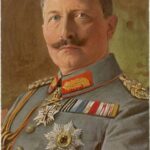
On 16 October 1962 National Security Advisor McGeorge Bundy, told President John Kennedy that the Soviet Union had installed nuclear tipped MRBMs on the island of Cuba, giving the Soviets a first strike nuclear capability 90 miles off the shores of the United States. Kennedy immediately convened the National Security Council, and the members proposed a range of actions, from doing nothing to launching airstrikes to destroy the missiles, followed by an invasion of Cuba. Throughout the debate Kennedy absorbed all of the information presented to him, keeping the memory of a book he read earlier that year called The Guns of August. Written by Barbara Tuchman, this book showed how Europe was plunged into World War I by the rash actions of several men, with the rashest of all actions coming from German’s Kaiser Wilhelm II.
When Archduke Franz Ferdinand, heir to the throne of Austria-Hungary, was assassinated by a Serbian terrorist on 28 June, 1914, very few statesmen and leaders believed that the murder would lead to a war. Those statesmen and leaders should have remembered the words of German chancellor Otto von Bismarck, who correctly prophesied that “some damn thing in the Balkans will start the next war”.
Austria-Hungary’s one firm ally in Europe was the German Empire, which was ruled by Kaiser Wilhelm II. Wilhelm became Kaiser of Germany upon the death of his father in 1888. He inherited Bismarck as his chancellor, and the two men immediately clashed. Bismarck was pragmatic and far seeing, realizing that a peaceful Europe, with clearly defined spheres of influence, was the best way to maintain the integrity of the German Empire, a state which he had created via three short wars with Denmark, Austria-Hungary, and France. The new Kaiser saw things differently. Where Bismarck was firm but cautious when it came to foreign policy, Kaiser Wilhelm was rash and impulsive, and he was extremely sensitive to any perceived slights against Germany, which he viewed as personal insults. If ever a man needed the sage advice of Don Corleone (“it’s not personal, it’s business”), it was Kaiser Wilhelm II.
The assassination of Franz Ferdinand prompted Austria-Hungary to issue an ultimatum to Serbia, and if Serbia accepted all of the terms of the ultimatum, it would have become little more than a vassal state to Austria-Hungary. When the Serbian government didn’t accede to all of the ultimatum’s demands, Austria-Hungary declared war on Serbia on 28 July, 1914. Hostilities began the next day with an intense artillery of the Serbian capital city of Belgrade.
Austria-Hungary was a member of the Triple Alliance, a defensive pact formed between Germany, Italy, and Austria-Hungary to counter the Triple Entente between the United Kingdom, France, and Russia. When Austria-Hungary declared war on Serbia, Italy immediately declared its neutrality, correctly noting that the Triple Alliance was a defense pact, not a pact to avenge assassinations that may or may not have been fomented in another country. That left Germany as the sole guarantor of Austria-Hungary’s security as the war began.
Had Bismarck been alive and still serving as the Kaiser’s chancellor, he probably would have said, “we don’t have a dog in this fight, so let Austria-Hungary go to war with Serbia. Let Russia mobilize to protect the Slavs, and if a war erupts between Austria-Hungary, Serbia, and Russia, all the better for Germany. We’ll make money providing arms to both sides”
Unfortunately for Germany and the world, Bismarck was dead in 31 July, 1914. That was the day that Kaiser Wilhelm II declared Kriegsgefahr (danger of war). This declaration empowered the German General Staff to take complete control of Germany’s rail system, enabling the rapid movement of Germany’s army to multiple fronts. The Kaiser then issued an ultimatum to Russia to cease its mobilization against Austria-Hungary within 12 hours or Germany would declare war on Russia. He then demanded that France, Russia’s primary ally, declare its neutrality, and as proof of neutrality France must surrender its fortress towns of Tours and Verdun to Germany.
These cascading events led to the eruption of World War I, which raged for the next four years, drastically altering the course of history. After the war was over, and Imperial Germany was destroyed, Theobold von Bethmann-Hollweg, who had served as the Kaiser’s chancellor from 1909-1917, was asked why Germany made those fateful decisions that led to war. He replied with this:
“Ach, if we only knew.”
Thirty-four years after the end of World War I Barbara Tuchman wrote The Guns of August. President Kennedy, who loved history, read the book, and he was so enamored with it that he instructed members of his cabinet to read it as well. Throughout the 13 days of that eyeball to eyeball confrontation with the Soviet Union, Kennedy would frequently ask his advisers, especially those who were advocating air strikes and/or invasion, “what happens next? What will the Soviets do if we take that step?”. He would often follow his questions with Bethmann-Hollweg’s answer to the question as to how Germany plunged the world into war in 1914 as a way of showing how rash actions almost always lead to utter disaster.
Tuchman’s book gave Kennedy a starkly vivid portrait of Kaiser Wilhelm II, and how his personality and ego, always sensitive to showing any signs of weakness, led him to take actions that led to his nation’s destruction. It’s rather ironic that Kennedy owes his steady nerves and pragmatic decisions during the Cuban Missile Crisis to a megalomaniac who was indirectly responsible for the creation of the country Kennedy faced on the precipice of nuclear annihilation in 1962. Just goes to show that examples of negative leadership can sometimes lead to positive results.